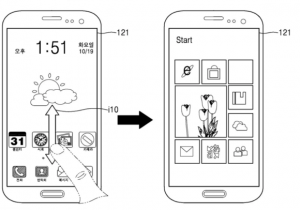
While OS virtualization is an old concept in the PC industry, it is the illustrations in the patent filing that have caught the fancy of observers. After all, there’s plenty to be intrigued by the idea of an android device allowing users to switch between operating systems.
The patent application filed by the South Korean company was first revealed by a report on SamMobile and then by MSPowerUser. From what we have learned so far about this ambitious project, the new technology could be extended to all sorts of devices including smartphones, tablets, computers, notebooks, and more.
(You can access the soft copy of the original patent filing here.)
A literal translation provided by the Korean Intellectual Property Office’s machine translation system reads: “In this specification, the case where as an example, the first operating system is the android, the second operating system is the window (Windows) is shown.”
However, it’s not just about Windows, the patent clearly mentions that the proposed technology will be compatible with a diverse range of OS platforms including Mac OS, Linux, and Tizen.
Details are still somewhat sketchy, but the patent seems to indicate that the host OS would be responsible for powering the device as usual while the secondary (virtualized) OS would essentially function as an app.
There will be provisions for controlling the secondary OS via all commonly used human interface devices (touchscreen, mouse, or keyboard) and it will have the autonomy to run its own programs.
This move to combine the most popular PC OS with the most popular smartphone OS, if and when implemented, could pave the way for a whole range of possibilities – especially for productivity users and developers. Some observers, however, also point out that Samsung might be forced to resolve some key issues before aiming to commercialize the innovation.
One such hindrance will be the fact that virtualized apps don’t typically enjoy full access to the hardware resources of the host device and therefore, tend to run slower and less efficiently.
